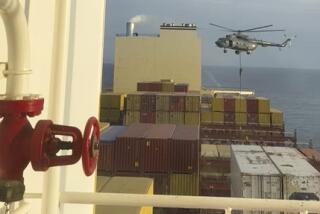Weinberger Pledges to Protect Gulf Shipping
- Share via
WASHINGTON — Defense Secretary Caspar W. Weinberger, reinforcing the Reagan Administration’s concern over Iran’s deployment of anti-ship missiles along the Persian Gulf, declared Sunday that the United States is “fully prepared to do what’s necessary to keep” the vital Middle East shipping lanes open.
“The importance of the . . . continued flow of oil to Europe, to Japan, to ourselves, to all of our friends and allies all over the world, is very obvious. You can’t have that interfered with,” Weinberger said on NBC’s “Meet the Press.”
Weinberger was responding to questions about Iran’s placement of Chinese-built HY-2 Silkworm missile batteries within range of ships moving through the narrow Strait of Hormuz, the only entrance into the oil-rich Persian Gulf.
More Powerful Missile
When they disclosed the Iranian missile deployment last week, U.S. military analysts described the land-based Silkworms as more powerful and accurate than missiles fired from aircraft and said their presence escalated the potential for a major confrontation in the volatile region. Pentagon officials also disclosed that 17 U.S. warships, led by the aircraft carrier Kitty Hawk, had moved within striking distance of the new missile batteries.
Asked if these developments indicated that the United States is on the verge of a major military action in the region, Weinberger said: “No, no, no, not at all. We are doing exactly what we do all the time in the event we are needed.”
The ship movements “are not unusual,” Weinberger said, “but we are examining all of the options that the President might have. . . . We have to be ready for a number of different contingencies whenever they might happen. And it is vital that the President have all those options available to him.”
U.S. Naval Escorts Possible
He indicated that one option might be for U.S. naval ships to escort civilian vessels of allied countries plying the waters of the gulf. “We are certainly very sympathetic to and listening carefully to any suggestions for our assistance in keeping navigation free in that area,” Weinberger said.
Both Iran and Iraq, engaged in a grueling 6 1/2-year war, have periodically attacked oil tankers and other merchant ships operating in the gulf. This has heightened strategic concern over continued access to the region’s oil supplies, although the free world’s dependence on these oil deposits has lessened in recent years.
A decade ago, nearly half the non-communist world’s oil was carried by tanker through the gulf and the narrow strait. That figure now has dropped to about 15% because of a decline in worldwide consumption of oil and the construction of new pipelines bypassing the strait.
The State Department said last week that the Iranian government had been told of U.S. concern that the missiles posed a threat to the free flow of oil from the Persian Gulf. Summarizing the message, Weinberger said, “We warned them that the area was international waters and any attempt to interfere with the shipping in that area would be viewed very seriously.”
Tehran radio, in a broadcast monitored in London on Sunday, described as “misleading propaganda” the suggestion that Iran is a threat to Persian Gulf shipping. The broadcast, quoting a Foreign Ministry spokesman, warned the United States that “any interference . . . will be met by a strong response from Iran and other Muslims in the world.”
Denies Spying on Israel
Weinberger, in the television interview, also denied reported comments of Sen. David Durenberger (R-Minn.), former chairman of the Senate Intelligence Committee, that the CIA recruited an Israeli military officer in 1982 to spy on Israel.
“No, I know that’s not the case,” Weinberger said. “And those are the most damaging kind of statements because they’re immediately picked up and used as a justification for further espionage against the United States. I think it’s a very damaging and very wrong statement.”
More to Read
Sign up for Essential California
The most important California stories and recommendations in your inbox every morning.
You may occasionally receive promotional content from the Los Angeles Times.













